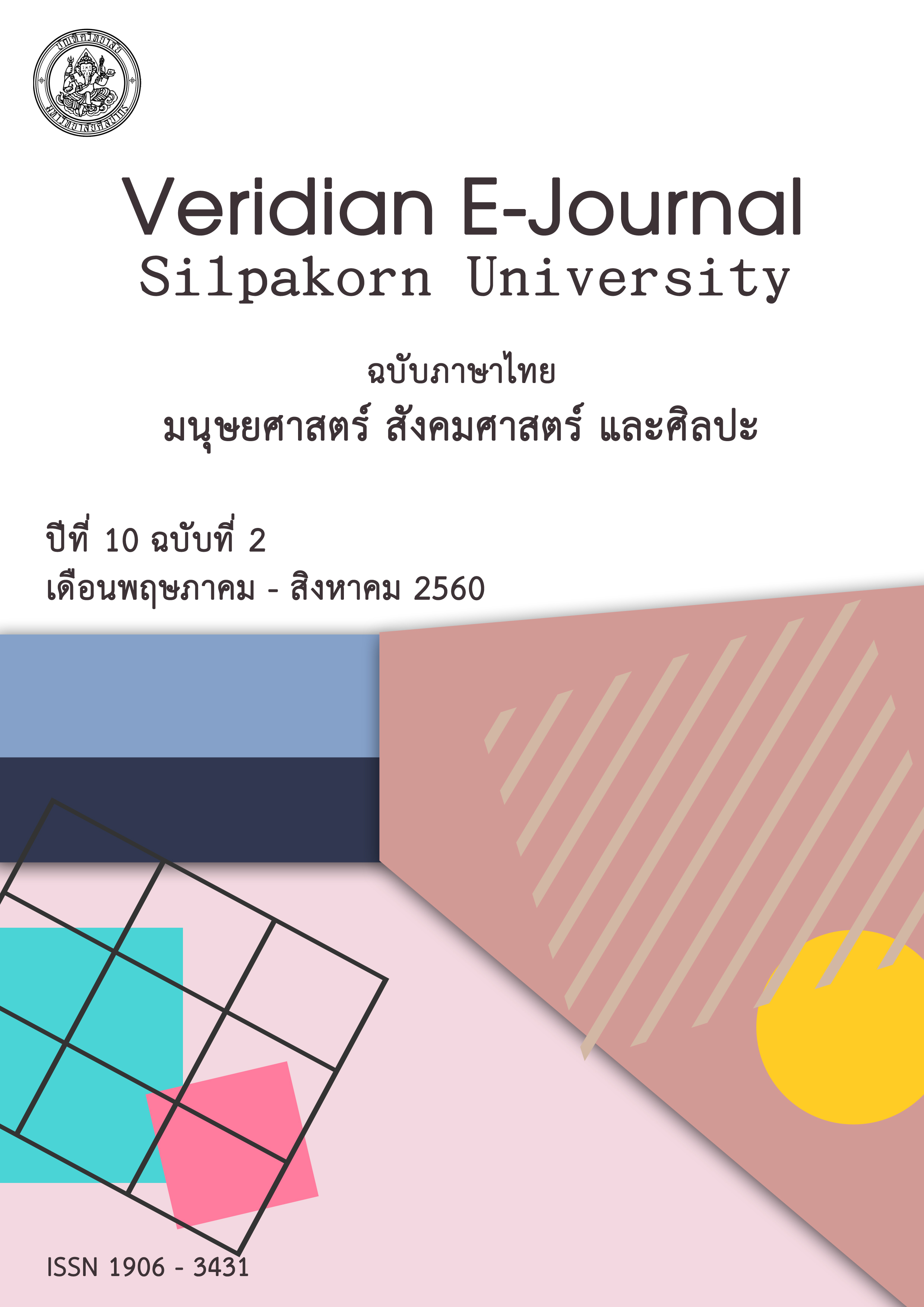การประเมินหลักสูตรปรัชญาดุษฎีบัณฑิต สาขาวิชาหลักสูตรและการสอน (หลักสูตรปรับปรุง พ.ศ. 2556) คณะศึกษาศาสตร์ มหาวิทยาลัยศิลปากร
Main Article Content
บทคัดย่อ
การวิจัยครั้งนี้มีวัตถุประสงค์ 1) เพื่อประเมินหลักสูตรปรัชญาดุษฎีบัณฑิต สาขาวิชาหลักสูตรและการสอน (หลักสูตรปรับปรุง พ.ศ. 2556) คณะศึกษาศาสตร์ มหาวิทยาลัยศิลปากร ในด้านบริบท ด้านปัจจัยนำเข้า ด้านกระบวนการ ด้านผลผลิต และด้านผลกระทบ และ2) เพื่อศึกษาปัญหาและแนวทางการพัฒนาและปรับปรุงหลักสูตร โดยใช้วิธีการประเมินแบบ CIPPI Model มีองค์ประกอบ 5 ด้านคือ ด้านบริบท ด้านปัจจัยนำเข้า ด้านกระบวนการ ด้านผลผลิต และด้านผลกระทบ เก็บรวบรวมข้อมูลโดยใช้การตรวจเอกสารหลักสูตร สอบถามความคิดเห็นและสัมภาษณ์ความคิดเห็นผู้ที่เกี่ยวข้องกับการใช้หลักสูตร 3 กลุ่ม ได้แก่ ผู้บริหาร 4 คน ผู้สอน/กรรมการตรวจสอบวิทยานิพนธ์/อาจารย์พิเศษ จำนวน 24 คน และนักศึกษา 46 คน เครื่องมือที่ใช้ในการวิจัย ประกอบด้วย แบบสอบถาม และแบบสัมภาษณ์ สถิติที่ใช้ในการวิเคราะห์ข้อมูลคือ ค่าร้อยละ ค่าเฉลี่ย ค่าเบี่ยงเบนมาตรฐาน และการวิเคราะห์เนื้อหา ผลการวิจัยพบว่า
1. หลักสูตรมีความสอดคล้องกันอยู่ในระดับมาก โดยด้านบริบทพบว่า ปรัชญาและวัตถุประสงค์ของหลักสูตรมีความสอดคล้องกับความต้องการของผู้เรียน รายวิชาได้ส่งเสริมให้นักศึกษามีทักษะกระบวนการในการวิจัย พัฒนาหลักสูตร การสอนและการนิเทศ หลักสูตรมีมาตรฐานตามกรอบมาตรฐานคุณวุฒิระดับอุดมศึกษา ด้านปัจจัยนำเข้าพบว่า มีการศึกษาดูงานเพื่อเสริมสร้างความเข้มแข็งทางด้านวิชาการ และ มีบุคลากรภายนอก (วิทยากร ผู้ทรงคุณวุฒิ) เข้ามาร่วมในการจัดการเรียนรู้ เพื่อพัฒนาความรู้และกระบวนการคิด คุณวุฒิ ความรู้ ประสบการณ์ผลงานทางวิชาการและผลงานวิจัยของอาจารย์มีศักยภาพเหมาะสม ด้านกระบวนการพบว่า การจัดการเรียนรู้กระตุ้นให้มีส่วนร่วมแสดงความคิดเห็นในชั้นเรียน และนักศึกษาได้รับการกระตุ้นให้กล้าซักถามเพื่อพัฒนาความรู้ในชั้นเรียน อาจารย์และนักศึกษามีระดับปฏิสัมพันธ์อย่างมาก การวัดและการประเมินผลพบว่ามีการประเมินความก้าวหน้าของนักศึกษาที่บรรลุจุดประสงค์การเรียนรู้เป็นปรนัย ตรวจสอบได้ อาจารย์ผู้สอนมีพฤติกรรมที่เหมาะสม เป็นตัวอย่างที่ดี ด้านผลผลิตพบว่า บัณฑิตที่จบการศึกษาเป็นที่ยอมรับของหน่วยงาน/ชุมชน และบุคคลในวิชาชีพ และด้านผลกระทบพบว่า บัณฑิตมีความภาคภูมิใจในสาขาวิชาหลักสูตรและ การสอน สามารถนำความรู้และประสบการณ์ที่ได้รับไปใช้ในการปฏิบัติงาน
2. ปัญหาและแนวทางการพัฒนาปรับปรุงหลักสูตรปรัชญาดุษฎีบัณฑิต (หลักสูตรปรับปรุง พ.ศ.2556) คณะศึกษาศาสตร์ มหาวิทยาลัยศิลปากร ด้านบริบทพบว่า หลักสูตรมีรายวิชาที่มีเนื้อหาซ้ำซ้อนกัน ด้านปัจจัยนำเข้าพบว่า ห้องเรียนมีระบบ wifi ไม่ทั่วถึง และห้องเรียนควรเอื้อต่อการเรียนรู้ในการจัดกลุ่มอภิปรายทั้งกลุ่มใหญ่และกลุ่มย่อย ด้านกระบวนการพบว่า บางรายวิชานักศึกษามีส่วนร่วมน้อยในการประเมินและปรับแผนการจัดการเรียนรู้ ด้านผลผลิตพบว่า นักศึกษาบางคนขาดวินัยในการเรียน บุคลิกภาพของความเป็นผู้นำทางวิชาการ และการเชื่อมโยงความรู้ในชั้นเรียนมาเป็นแนวทางการทำวิทยานิพนธ์ และด้านผลกระทบ พบว่า บทบาทของนักศึกษาบางส่วนยังไม่สะท้อนศักยภาพด้านการพัฒนาหลักสูตร การประเมินผลการเรียนรู้ และการมีส่วนร่วมของการทำงานในหน่วยงานที่ชัดเจนเป็นที่ประจักษ์ แนวทางการปรับปรุงหลักสูตรควรปรับรายวิชาไม่ให้ซ้ำซ้อน และจัดหลักสูตรให้มีความลึกเฉพาะสาขาวิชา ห้องเรียนควรเป็นห้องเรียนที่มี wifi ทั่วถึงเหมาะสำหรับการจัดกลุ่มประเภทต่างๆ เพิ่มสมรรถนะในการเป็นผู้นำทางหลักสูตรและการสอน
The purposes of this research were to 1) evaluate the curriculum on doctoral of philosophy program in curriculum and instruction, (Development Curriculum 2013) faculty of education Silpakorn University in context, input, process, product, and impact, and 2) study problems and guidelines to improve the curriculum. The research staff conducted by using the CIPPI Model (five parts; context, input, process, product, and impact). The data were collected by checking the documentary of the curriculum, questionnaires and interview the people who involved in the curriculum using for their opinions on the matter. There were 3 groups of people were involved in the curriculum using. They were 4 executives, 24 instructors/considering thesis committee members, and 46 graduates. The instruments included the questionnaires and the interview form. The data were analyzed by using percentage (%), mean (), standard deviation (S.D.), and content analysis.
The results of the research were as follows :
1. The result of the curriculum evaluation showed their opinions appropriate at a high level. The context evaluation: philosophy and objective of curriculum had according with need of the graduates. The course supported the graduates had research skill, curriculum development, supervision and instruction, the curriculum had the standard following the qualifications framework higher education. The input evaluation: the study visit to enhance the strengthening academic and had external personnel (lecturer/professional) joined in the study system to develop knowledge and thinking process. The extra instructors had qualification, knowledge, experience, academic work and research of instructors had the appropriate potency. The process evaluation: the graduates were motivated to share their ideas in the class (interactive communication) and they were motivated dare to ask for developing knowledge in class, the instructors and the graduates had interaction at a high level, the assessment had assess their progress achieve the purpose had objective could verified. The instructors had appropriately behavior and good model.” The product evaluation: the graduated students had be acceptable from department / community and the person in profession.” The impact evaluation: the graduated had proud in curriculum and instruction branch, they applying in their work.
2. The problem and the guideline to improve of the curriculum on doctor of philosophy program in curriculum and instruction, (Development Curriculum 2013) faculty of education Silpakorn University, as follows: 1) The context: the curriculum had redundant content. 2) The input: the classroom did not have wifi and it unaccommodating for big focus group discussion learning and small group. 3) The process: some courses not allow the graduated students had participated about assessment and improved lesson plan. 4) The product: some doctoral students lack of discipline in learning, did not have personality of academic leadership and lack of connecting knowledge in classroom for guideline in their thesis and 5) The impact: the role of some doctoral students did not reflected developing curriculum potentiality, assessment of learning and participation in their institution clearly. The guideline for improving of the curriculum should redundant content and set the curriculum had deep in branch, the classroom should have wifi and appropriated for setting every groups, adding the instruction and curriculum leadership competency.

